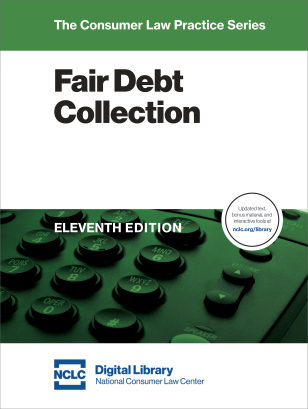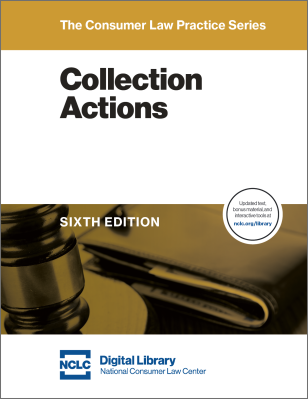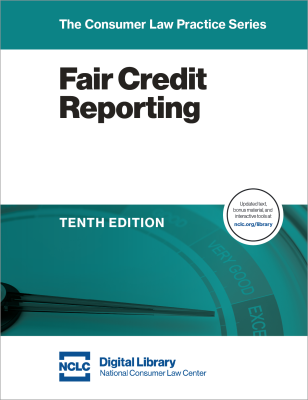A November 2023 CFPB report on the Fair Debt Collection Practices Act (FDCPA) highlights the untapped potential of FDCPA claims where debt collectors collect on medical debt not owed or owed in a lesser amount. The report describes how tens of millions of Americans face medical debt collection—somewhere between 17% and 35% of all adults have unpaid medical bills. Most consumers with collection tradelines on their credit reports have medical debt tradelines. In addition, 15% of all complaints to the CFPB involve medical debt, and about half of those involve complaints about debts that are not owed.
This article sets out common situations where medical debt is not owed or is owed in a lesser amount than the amount sought, and then describes how an FDCPA claim can successfully challenge such medical debt collection. The article then highlights three specific areas where the CFPB has indicated that the FDCPA can challenge collection of medical debt:
- Where the amount sought does not comply with the new federal No Surprises Act that limits charges on out-of-network services;
- Where a resident’s nursing home debt is collected from family members or other third parties in violation of the federal Nursing Home Reform Act;
- Where the amount sought violates one of the increasing number of state laws that limit a patient’s liability for medical debt.
Further detail on defenses to medical debt can be found in the just released (this week) Sixth Edition of NCLC’s Collection Actions Chapter 9, “Medical Debt.” FDCPA issues are examined in depth in NCLC’s Fair Debt Collection (10th ed.).
When Medical Debt in Collection Is Not Owed or Owed in a Lesser Amount
There are varied reasons that medical debt in collection is not owed or not owed in that amount:
- The new federal No Surprises Act prohibits certain out-of-network charges (as described in more detail, infra).
- The Nursing Home Reform Act limits the liability of family members and other third parties for a nursing home resident’s debt to the nursing home (as described in more detail, infra).
- State legislation is increasingly placing limits on the amount owed for medical debt (as described in more detail, infra).
- The debt has already been paid by Medicare, Medicaid, private insurance, or a financial assistance program, but the collector did not have updated information from the medical provider.
- The consumer has already made payment on the debt or settled the debt directly with the medical provider, but the collector did not have updated information from the provider.
- The debt should have been paid by Medicare, Medicaid, private insurance, or a financial assistance program but the medical provider did not properly follow through on the paperwork.
- An active-duty service member or military veteran’s medical care was or should have been paid by a government-sponsored health insurance program such as Tricare.
- The medical debt has been discharged in bankruptcy—rarely if ever will such debt be non-dischargeable.
- The charged medical services were never received.
- The provided services are more accurately described under a less expensive billing code (i.e., upcoding).
- The medical charge is unreasonable, even if based on “standard rates” (i.e., chargemaster rate).
- The amount of the medical debt is inaccurate due to billing errors like double charging a consumer.
FDCPA Liability for Collection of Medical Debt Not Owed or Owed in a Lesser Amount
The CFPB in three recent interpretations has explained why collection of medical debt not owed violates the FDCPA:
- CFPB, Fair Debt Collection Practices Act Annual Report (Nov. 2023);
- CFPB Circular 2022-05: Debt Collection and Consumer Reporting Practices Involving Invalid Nursing Home Debts, 87 Fed. Reg. 57,375 (Sept. 20, 2022);
- CFPB, Bulletin 2022-01, Medical Debt Collection and Consumer Reporting Requirements in Connection with the No Surprises Act, 87 Fed. Reg. 3025 (Jan. 20, 2022).
Collection of debt not owed in the amount sought violates 15 U.S.C. § 1692e, which prohibits “deceptive, or misleading representation or means.” It is deceptive to misrepresent that a consumer must pay a debt that arises from a contract provision that is illegal and unenforceable under federal or state law. Similarly, a debt collector may violate this provision when it claims that a consumer is obligated on a debt where there is no obligation or an obligation in a lesser amount. See generally NCLC’s Fair Debt Collection Chapter 7.
The FDCPA at 15 U.S.C. § 1692f(1) prohibits the “collection of any amount (including any interest, fee, charge, or expense incidental to the principal obligation) unless such amount is expressly authorized by the agreement creating the debt or permitted by law.” The CFPB has explained that this section permits collection “only if: (1) the agreement creating the debt expressly permits the charge and some law does not prohibit it; or (2) some law expressly permits the charge, even if the agreement creating the debt is silent.” See CFPB, Advisory Opinion, Debt Collection Practices (Regulation F); Pay-to-Pay Fees, 87 Fed. Reg. 39,733, 39,734 (July 5, 2022). See also NCLC’s Fair Debt Collection § 8.3.
FDCPA § 1692e(8) makes debt collectors liable for furnishing false credit information they know or should know is false. For example, § 1692e(8) is violated when a collection agency furnishes information to a consumer reporting agency (CRA) about a debt that is not owed or is not owed in that amount, as long as the collection agency knows or should know that the information is false. Unlike the Fair Credit Reporting Act requirement concerning furnisher liability, the consumer need not first dispute the debt with the CRA. However, collectors are likely to defend that they did not know and should not have known—asserting reliance on the medical provider to assert the amount owed. Reliance on the medical provider as part of a bona fide error defense is discussed below.
A more straightforward application of § 1692e(8) is that the provision also requires a debt collector to include a consumer’s dispute of a debt whenever the collector communicates about the debt to a CRA. See NCLC’s Fair Debt Collection § 7.2.8.4. When a debt collector learns of a dispute, there is no affirmative obligation to report the dispute to a CRA, but it must do so the next time it reports about the debt to the CRA. CRAs must then note that the debt is disputed on the credit report. See NCLC’s Fair Credit Reporting § 4.4.6.9.3a.
While the collector must accurately report to a CRA that the debt is disputed, the collector need not resolve the dispute. The collector can continue to report the same credit information if it has reason to believe it to be true, as long as it includes in the report that the consumer disputes the information.
Another potential FDCPA violation involving medical debt is called “passive collection” or “parking.” Because of the small size of some medical debt, a collector may prefer to simply report the debt to a CRA and wait for the consumer to pay on the debt when they are in the middle of a significant credit transaction, such as buying a car or house, and seek to improve their credit rating. But reporting to a CRA about a debt without first taking steps to provide notice to the consumer is prohibited under FDCPA Regulation F, 12 C.F.R. § 1006.30(a). See NCLC’s Fair Debt Collection § 8.12.
Must and Should a Consumer Bring an FDCPA Action Without First Disputing the Debt?
A consumer is not required to dispute the medical debt amount with a collector to recover from that collector under the FDCPA. SeeVangorden v. Second Round, L.P., 897 F.3d 433 (2d Cir. 2018); McLaughlin v. Phelan Hallinan & Schmieg, L.L.P., 756 F.3d 240, 247 (3d Cir. 2014); Russell v. Absolute Collection Services, Inc., 763 F.3d 385, 392–393 (4th Cir. 2014); NCLC’s Fair Debt Collection § 9.9.
However, there are important reasons why the consumer might want to first dispute the debt before bringing an FDCPA claim. First, if the consumer disputes the debt in writing within 30 days of receipt of the validation notice, the debt collector must cease collection on the debt until it obtains verification of the debt. See 15 U.S.C. 1692g(b); NCLC’s Fair Debt Collection § 9.10. The collection pause provides some breathing room for the consumer to further investigate the alleged debt—for example by contacting the insurer or medical provider—or to apply for financial assistance, if available. If the collector resumes collection activity before providing verification, this would also be a FDCPA violation.
Another reason to dispute a debt, as described supra, is that a collector must report the debt as disputed when communicating with a CRA. If the collector fails to do so, the consumer has an FDCPA claim.
Responding to a Bona Fide Error Defense
The FDCPA generally is a strict liability statute unless an FDCPA provision explicitly requires intent or knowledge, or the debt collector successfully establishes a bona fide error defense. See NCLC’s Fair Debt Collection § 3.2.4. The FDCPA provides that “A debt collector may not be held liable in any action . . . if the debt collector shows by a preponderance of evidence that the violation was not intentional and resulted from a bona fide error notwithstanding the maintenance of procedures reasonably adapted to avoid any such error.” 15 U.S.C. § 1692k(c); NCLC’s Fair Debt Collection § 12.2.
When responding to a bona fide error defense, consumers should seek to discover additional information about the reasonableness of the debt collector’s procedures. For example, if the collector asserts that it maintained reasonable procedures because it relied on the amount specified by the medical provider, the consumer might want to seek discovery related to:
- Account Updates—whether the collector periodically obtains updated account information from the medical provider and, if so, how often.
- Account-Level Documentation—what information the debt collector receives from the medical provider and whether the information it receives is just a summary or provides account level documentation to support the amount claimed due.
- Warning Flags About Accuracy—the number and percentage of accounts from this medical provider that result in disputes and any procedures in place to identify and respond to high or increasing numbers or percentages of accounts with disputes.
- Dispute Procedures—[if the consumer disputed the debt] the procedures that the debt collector takes to verify the disputed debt, including review of updated account information, review of account-level documentation, and whether it communicates with the medical provider regarding the dispute.
See NCLC’s Fair Debt Collection §§ 12.2.7, 12.2.9.2 for more about when the collector’s reliance on the creditor is a reasonable procedure.
Article III Standing in Federal Court for the FDCPA Claim
Any FDCPA claim in federal court must deal with current federal court views as to Article III standing. Federal court standing requirements for FDCPA claims are set out in detail at NCLC’s Fair Debt Collection § 11.15. In particular, § 11.15.2 deals with standing where collectors demand an excessive amount.
There may not be enough injury to satisfy federal court standing requirements where the consumer’s only injury is that the collector merely seeks to collect an excessive amount. But there is standing where a consumer has responded to collection efforts by making a payment on a debt not owed, or a payment in excess of the debt’s correct amount. The consumer may also have standing where the fact that the consumer is faced with the unexpected medical debt liability, is prevented from paying another debt or from making a purchase. See NCLC’s Fair Debt Collection §§ 11.15.3.4.1, 11.15.3.4.4.
There are also strong arguments that costs associated with the consumer’s investigation of the amount confer standing. However, the attorney fees and other costs incurred to file and litigate the FDCPA suit itself, which are recoverable if the consumer prevails, are insufficient, and some courts have viewed all investigation costs with skepticism. See NCLC’s Fair Debt Collection § 11.15.3.4.3.
Always investigate whether the debt collector has reported the debt to a CRA or other third party. Because of its analogy to common law defamation torts, there is strong authority supporting the view that publication of false information to a third party meets the injury-in-fact requirement for Article III standing. See NCLC’s Fair Debt Collection § 11.15.7.
Many courts have held that emotional distress is a concrete harm that satisfies Article III’s injury-in-fact requirement. However, there is also substantial contrary authority, and perfunctory allegations are likely to be found insufficient. See NCLC’s Fair Debt Collection § 11.15.3.4.2.
Another approach to deal with standing requirements is to bring the FDCPA action in state court, where state standing rules may be more liberal than those in federal court. For a state-by-state analysis of state court standing rules for consumer claims, see NCLC’s Fair Debt Collection Appx. I.
If the collector removes the case to federal court, the collector bears the burden of proving there is federal court standing for the case. The collector then can hardly argue that there is no standing and may even face sanctions if it does. A defendant’s arguments that there is federal court standing also may be helpful to the consumer if the case is remanded to state court and it is the consumer arguing for state court standing. See generally NCLC’s Protecting Federal Claims by Using State Courts.
CFPB Supervisory and Sub-Regulatory Guidance on the FDCPA and Medical Debt
The CFPB publishes consumer financial protection circulars to all parties with authority to enforce federal consumer financial law to promote consistency in enforcement efforts. As discussed in the next two sections, the CFPB in 2022 issued a bulletin on the FDCPA and the No Surprises Act, and also a circular concerning the FDCPA and the Nursing Home Reform Act. A 2021 OCC rule adopted by the CFPB codifies the role of such supervisory guidance:
Unlike a law or regulation, supervisory guidance does not have the force and effect of law, and the Bureau does not take enforcement actions based on supervisory guidance. Rather, supervisory guidance outlines the Bureau’s supervisory expectations or priorities and articulates the Bureau’s general views regarding appropriate practices for a given subject area.
See 12 C.F.R. § 1074, app. A; 86 Fed. Reg. 9261 (Feb. 12, 2021). See also NCLC’s Fair Debt Collection § 3.4.4.4.
FDCPA Claims Where Medical Debt Violates the Federal No Surprises Act
Effective generally for medical insurance plan years beginning on or after January 1, 2022, the No Surprises Act protects consumers with private health insurance from surprise medical bills when they receive emergency services, non-emergency services from nonparticipating providers at participating health care facilities, and air ambulance services from nonparticipating providers of air ambulance services. The No Surprises Act also includes certain protections for uninsured individuals from surprise medical bills.
CFPB Bulletin 2022-01: Medical Debt Collection and Consumer Reporting Requirements in Connection with the No Surprises Act, provides that the FDCPA § 1992e prohibition on misrepresentations includes misrepresenting that a consumer must pay a debt stemming from a charge that exceeds the amount permitted by the No Surprises Act. For example, a debt collector who represents that a consumer owes a debt arising from out-of-network charges for emergency services may violate § 1692e if those charges exceed the amount permitted by the No Surprises Act. Courts have also emphasized that collecting an amount that exceeds what is owed would violate the § 1692f prohibition on unfair or unconscionable debt collection practices. See NCLC’s Fair Debt Collection § 8.3; Appx. B.3.10.
FDCPA Claims Where Collection Violates the Nursing Home Reform Act
Under the Nursing Home Reform Act, a nursing facility that participates in Medicaid or a skilled nursing facility that participates in Medicare may not request or require as a condition of a resident’s admission or continued stay that the facility receive a guarantee of payment from a third party, such as a relative or representative. Contractual provisions that violate that prohibition are illegal and unenforceable. This applies even for those residents of such facilities not receiving Medicare or Medicaid benefits. See 42 U.S.C. § 1395i-3(c)(5)(B)(ii); 42 C.F.R. § 483.15(a)(3); NCLC’s Collection Actions § 9.6.7.2 (new Sixth Edition).
This means that family members and representatives have no personal responsibility for the resident’s care. While a relative or representative may sign a contract promising to provide payment from the resident’s income or resources, the Nursing Home Reform Act explicitly prohibits the nursing facility from imposing “personal financial liability” on an individual signing such a provision. As a result, collection lawsuits brought personally against a resident’s relative or representative for damages related to an alleged breach of contract would violate the Nursing Home Reform Act. See 42 U.S.C. § 1395i-3(c)(5)(B)(ii).
CFPB Circular 2022-05: Debt Collection and Consumer Reporting Practices Involving Invalid Nursing Home Debts, indicates that attempts to collect from third parties in violation of the Nursing Home Reform Act is an FDCPA violation. Section 1692e is violated when a debt collector (including a collection attorney) seeks payment from a resident’s family members or other representative, sues the third party in court, or reports the debt to a reporting agency as belonging to the third party. It is also deceptive to misrepresent that a consumer must pay a debt that arises from a contract provision that is illegal and unenforceable under federal or state law.
Sometimes a collection lawsuit will claim a third party is liable not based on the party’s assumption of the resident’s debt, but because the third party allegedly engaged in financial wrongdoing in relation to the resident’s assets. Often the collection attorney will have no basis for that allegation and just adds it to its complaint for its in terrorem effect. The CFPB circular finds it may violate § 1692e to make that claim without any factual basis for the allegation, and where the allegation proves to be false.
FDCPA Claims Where Medical Debt Amount Sought Violates State Law
States are increasingly enacting legislation that places limits on the size of medical bills and on medical debt collection practices. States with extensive regulation of medical debt collection include:
- California;
- Colorado;
- Connecticut;
- Illinois;
- Maryland;
- Massachusetts;
- Nevada;
- New Jersey;
- New Mexico; and
- New York.
Some states have comprehensive balancing billing statutes that are stronger in at least some areas than the federal No Surprises Act:
- California (including ground ambulance services);
- Colorado (including ground ambulance services);
- Connecticut;
- Florida;
- Georgia;
- Illinois;
- Maine;
- Maryland (including ground ambulance services);
- Michigan;
- New Hampshire;
- New Jersey;
- New Mexico;
- New York (including ground ambulance services);
- Ohio (including ground ambulance services);
- Oregon;
- Texas;
- Virginia;
- Washington.
In addition, a number of states have certain limited, but still noteworthy, limits on medical debts or debt collection, including:
- Arkansas has a two-year statute of limitations for medical debt.
- Delaware limits charges and post-judgment remedies and limits balanced billing for certain insureds, including for ground ambulance services.
- Florida limits medical fees that can be charged to a patient whose medical care has been covered by personal injury protection insurance.
- Maine limits collection actions for those qualifying for financial assistance.
- Minnesota restricts collection communication that implies that emergency services could be withheld.
- North Carolina limits collection while an application for financial assistance is pending and has enacted certain other limits on medical debt collection.
- North Dakota limits late charges on medical debt.
- Ohio limits post-judgment home foreclosure where debts arose from a medical service.
- Oklahoma provides discounts on hospital bills for low-income patients.
- Rhode Island limits hospital charges for low-income patients.
- South Carolina has a program to help low-income consumers pay for medical bills.
- Tennessee limits charges for uninsured patients.
- Texas limits unconscionable hospital and emergency services.
- Utah has timing requirements before a health care provider can send a debt to collection.
- Vermont limits charges large medical facilities bill to low-income patients and limits balanced billing for certain insureds, including for ground ambulance services.
- Virginia restricts referral of medical debts to collection if a claim has been made for workers’ compensation or compensation for crime victims.
- Washington requires hospital bill discounts for low-income patients and requires debt collectors provide certain information concerning a medical debt.
- West Virginia limits balanced billing for certain insureds, including for ground ambulance services.
A state-by-state analysis of these limits on medical debt collection with statutory citations is available at NCLC’s Collection Actions § 9.4.3 (new Sixth Edition). Because of recent momentum in the enactment of laws protecting debtors of medical debt, check for recent state legislation. Some recent developments are highlighted in the CFPB’s November 2023 report.
Collectors seeking medical debt in amounts higher than allowed by state law may not only violate state law, but also the FDCPA. See the discussion of 15 U.S.C. § 1692f(1), supra. The charge can also be deceptive under § 1692(e). Medical debt collectors also violate § 1692e(8) when they furnish credit information to a CRA that they know or should know is false.
Acknowledgements
Thanks to NCLC’s attorneys for their contributions to this article: Anna Anderson (the nursing home discussion), Chi Chi Wu (the credit reporting discussion), Carolyn Carter (the standing discussion), and Jon Sheldon. Special thanks to Denise Lisio for editing and publishing the article.





